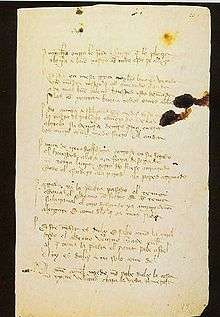The Book of Good Love
 | |
| Author | Juan Ruiz Archpriest of Hita |
|---|---|
| Original title | El libro del buen amor |
| Country | Spain |
| Language | Spanish |
| Genre | mester de clerecía |
| Publisher | None |
Publication date | 1330; expansion completed 1343 |
| Media type | Manuscript |
The Book of Good Love (El libro de buen amor), considered to be one of the masterpieces of Spanish poetry, is a semi-biographical account of romantic adventures by Juan Ruiz, the Archpriest of Hita, the earliest version of which dates from 1330; the author completed it with revisions and expansions in 1343.
The work is considered as the best piece in the medieval genre known as mester de clerecía.
The Book begins with prayers and a guide as to how to read the work, followed by stories each containing a moral and often comical tale.
Theme and structure
The Book of Good Love is a varied and extensive composition of 1728 stanzas, centering on the fictitious autobiography of Juan Ruiz, Archpriest of Hita. Today three manuscripts of the work survive: the Toledo (T) and Gayoso (G) manuscripts originating from the fourteenth century, and the Salamanca (S) manuscript copied at the start of the fifteenth century by Alonso de Paradinas. All three manuscripts have various pages missing, which prevents a complete reading of the book, and each manuscript varies extensively from each other due to the diversions of the authors. The work most commonly read today was suggested by Ramón Menéndez Pidal in 1898 based on sections from all three manuscripts.
The book is famous for its variety of:
- Content (examples, love stories, traditional bucolic poems, fables, lyrical compositions, etc.)
- Meter (the cuaderna vía, sixteen syllabic verses, zéjel stanzas, etc.)
- Tone (serious, festive, religious, profane, etc.)
The work is composed of the following:
- The introduction, where the author explains how the book should be interpreted.
- A fictitious autobiography of the author in which he tells us of his relationships with women of different origin and social status: a nun, a Moor, a housewife he spied praying, a baker, a noble woman and several mountain women (serranas), often helped by another woman named Urraca, better known as Trotaconventos (Trots-between-monasteries)
- Several examples (parables, fables and tales) which serve as moral education at the end of each episode.
- The dispute between the author and Love (Don Amor), in which he accuses Love of being the cause of the seven mortal sins
- The tale of the love of Mr. Melon (don Melón) and Mrs. Endrina, an adaptation of the medieval elegiac comedy Pamphilus de amore.
- The tale of a battle between Carnival ("Don Carnal") and Lent ("Doña Cuaresma")
- A commentary of "Ars Amandi" (Art of Love) by Ovid
- A number of songs dedicated to Mary, mother of Jesus
- A number of profane songs, such as that upon the death of "Trotaconventos"
Interpretation
The title The Book of Good Love is inferred from the text, and who or what Good Love may be is not revealed by the author.
The Book of Good Love explains how men must be careful about Love that can be Good (el buen amor) or Foolish (el loco amor). The Good Love is God's one and is preferred to the Foolish love which only gives men sins. Juan Ruiz gives the reader a lot of examples to explain his theory and avoid Foolish love in name of Good one.
Further reading
- Cacho Blecua, Juan Manuel y María Jesús Lacarra Ducay, Historia de la literatura española, I. Entre oralidad y escritura: la Edad Media, José Carlos Mainer (dir.), [s. l.], Crítica, 2012, págs. 367-375. ISBN 978-84-9892-367-4
- Deyermond, Alan D. (2001) Historia de la literatura española, vol. 1: La Edad Media, Barcelona: Ariel (1.ª ed. 1973), pp. 189–207. ISBN 84-344-8305-X
- Deyermond, Alan (2004) The "Libro de Buen Amor" in England: a tribute to Gerald Gybbon-Monypenny. Manchester: Manchester Spanish & Portuguese Studies ISBN 0-9539968-6-7
- Gybbon-Monypenny, G. B. (1984) «Introducción biográfica y crítica» to his edition of the Libro de buen amor, (Clásicos Castalia; 161), Madrid: Castalia'; pp. 7–95.
- Menéndez Peláez, Jesús; et al. (2010). Historia de la literatura española. Volumen I. Edad Media. León: Everest. p. 558. ISBN 978-84-241-1928-7.
External links
| Wikimedia Commons has media related to Libro de buen amor. |
- Libro de buen amor, original text in Spanish
- Juan Ruiz, Arcipreste de Hita, y el libro del buen amor, comprehensive readers' research and critique at Centro Virtual Cervantes
- El libro de buen amor, 'T' manuscript (14th century), digitized and available at Biblioteca Digital Hispánica, Biblioteca Nacional de España